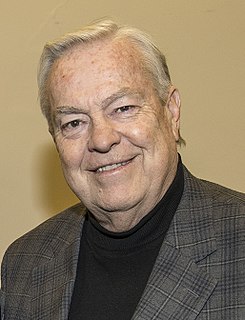A Quote by Rupert Murdoch
Great journalism will always attract readers. The words, pictures and graphics that are the stuff of journalism have to be brilliantly packaged; they must feed the mind and move the heart.
Related Quotes
The Lord's Prayer is 66 words, the Gettysburg Address is 286 words, there are 1.322 words in the Declaration of Independence, but government regulations on the sale of cabbage total 26.911 words. The difference between literature and journalism is that journalism is unreadable and literature is not read.
Anyone who does investigative journalism is not in it for the money. Investigative journalism by nature is the most work intensive kind of journalism you can take on. That's why you see less and less investigative journalism at newspapers and magazines. No matter what you're paid for it, you put in so many man-hours it's one of the least lucrative aspects of journalism you can take on.
From about ninth grade on, I knew I was a writer at heart. I had fantasies of being a great novelist, but I thought that seemed like an iffy way to try to make a living. So I tried journalism while in college, and really liked it. But even in journalism, I've always pursued ways to be somewhat literary, whether writing a column or writing books.
I want to set up a new standard: ‘scientific journalism.’ If you publish a paper on DNA, you are required, by all the good biological journals, to submit the data that has informed your research—the idea being that people will replicate it, check it, verify it. So this is something that needs to be done for journalism as well. There is an immediate power imbalance, in that readers are unable to verify what they are being told, and that leads to abuse.
I got in journalism for any number of reasons, not least because it's so much fun. Journalism should be in the business of putting pressure on power, finding out the truth, of shining a light on injustice, of, when appropriate, being amusing and entertaining - it's a complicated and varied beast, journalism.
Sure enough, as merger has followed merger, journalism has been driven further down the hierarchy of values in the huge conglomerates that dominate what we see, read and hear. And to feed the profit margins journalism has been directed to other priorities than "the news we need to know to keep our freedoms"
I was in the journalism program in college and had some internships in print journalism during the summers. The plan was to go to Columbia University Graduate School of Journalism to learn broadcasting after I graduated. I was enrolled and everything, but ultimately decided that I could never afford to pay back the loan I'd have to take out.




































